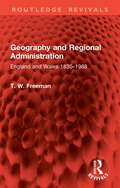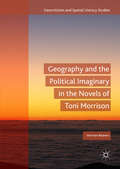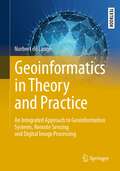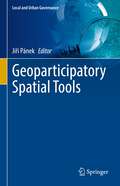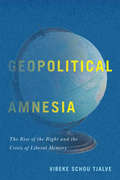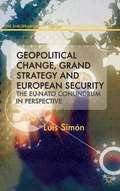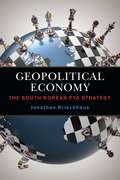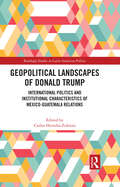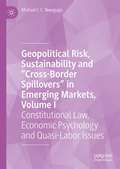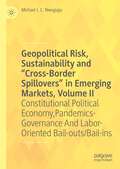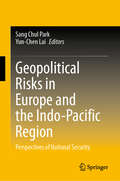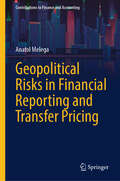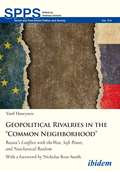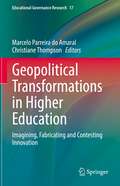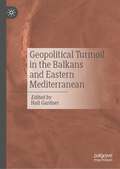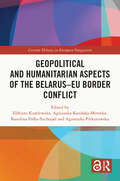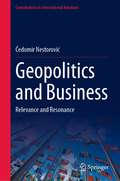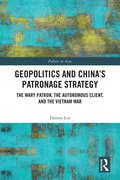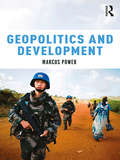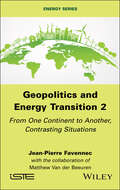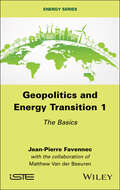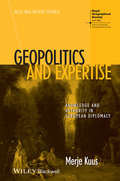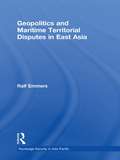- Table View
- List View
Geography and Regional Administration: England and Wales 1830–1968 (Routledge Revivals)
by T. W. FreemanAt the time of the publication of this book in its fourth edition in 1969, Ireland was alone globally in having experienced a decline of population for more than a century. National movements in Wales and Scotland made the story of the Irish Republic’s first fifty years increasingly interesting. Traditional and conservative as Ireland’s life may have seemed in the late 20th Century it had changed considerably since 1921. Like much of Western Europe it continues to share the experience of a declining number of agricultural workers and its government, like that of many other countries is concerned with the problem of industrial growth. The book analyses the physical environment and the life of 20th century Ireland whilst it was in the throes of an economic revolution.
Geography and the Political Imaginary in the Novels of Toni Morrison (Geocriticism and Spatial Literary Studies)
by Herman BeaversThis book examines Toni Morrison’s fiction as a sustained effort to challenge the dominant narratives produced in the white supremacist political imaginary and conceptualize a more inclusive political imaginary in which black bodies are valued. Herman Beavers closely examines politics of scale and contentious politics in order to discern Morrison's larger intent of revealing the deep structure of power relations in black communities that will enable them to fashion counterhegemonic projects. The volume explores how Morrison stages her ruminations on the political imaginary in neighborhoods or small towns; rooms, houses or streets. Beavers argues that these spatial and domestic geographies are sites where the management of traumatic injury is integral to establishing a sense of place, proposing these “tight spaces” as sites where narratives are produced and contested; sites of inscription and erasure, utterance and silence.
Geoinformatics in Theory and Practice: An Integrated Approach to Geoinformation Systems, Remote Sensing and Digital Image Processing (Springer Textbooks in Earth Sciences, Geography and Environment)
by Norbert de LangeThis textbook is intended to display a broad, methodological introduction to geoinformatics and geoinformation science. It deals with the recording, modeling, processing and analysis as well as presenting and distributing of geodata. As an integrated approach it is dedicated to the multidisciplinary application of methods and concepts of computer science to solve spatial tasks. First the reader receives an introduction to the approach and tasks of geoinformatics, basic concepts and general principles of information processing as well as essentials of computer science. Then this textbook focuses on the following topics: spatial reference systems, digital spatial data, interoperability of spatial data, visualization of spatial information, data organization and database systems, geoinformation systems, remote sensing and digital image processing.The result is a comprehensive manual for studies and practical applications in geoinformatics. It serves also as a basis to support and deepen methodological courses in geography, geology, geodesy and surveying as well as all environmental sciences. In this first English edition, the author has updated and significantly expanded the fourth German edition. New additions include the development of apps, graphical presentation on the web, geodata-bases and recent methods of classification. This book is based on the original German 4th edition Geoinformatik in Theorie und Praxis by Norbert de Lange, published by Springer-Verlag GmbH Germany, part of Springer Nature in 2020 and still presents the only integrated perspective on geoinformatics and geoinformation science. This book was translated with the help of artificial intelligence (machine translation by the service DeepL.com) first and then significantly revised with regard to technical terms and special topics of geoinformatics.
Geometry of the Passions: Fear, Hope, Happiness: Philosophy and Political Use (Lorenzo Da Ponte Italian Library)
by Remo Bodei Gianpiero W. DoeblerThe passions have long been condemned as a creator of disturbance and purveyor of the temporary loss of reason, but as Remo Bodei argues in Geometry of the Passions, we must abandon the perception that order and disorder are in a constant state of collision. By means of a theoretical and historical analysis, Bodei interprets the relationship between passion and reason as a conflict between two complementary logics. Geometry of the Passions investigates the paradoxical conflict-collaboration between passions and reason, and between individual and political projects. Tracing the roles passion and reason have played throughout history, including in the political agendas of Descartes, Hobbes, and the French Jacobins, Geometry of the Passions reveals how passion and reason may be used as a vehicle for affirmation rather than self-enslavement.
Geoparticipatory Spatial Tools (Local and Urban Governance)
by Jiří PánekThe book explores the key factors affecting the successful implementation of public participation spatial systems in participatory planning as part of the urban governance system. It brings insight from nation-wide research in the Czech Republic and the implications to other countries in the region and beyond. The main aim of the proposed book is to analyse the state-of-the-art of using geoparticipatory tools for citizens’ participation in community decision-making process and to suggest the effective implementation of the geoparticipatory tools available in urban governance. This book explores the situation in the Czech Republic as a representative of for Eastern Bloc country, three decades after the political transition, on its way to public participation in local and urban governance. The active involvement of the citizens into the local and urban decision making process via geoparticipatory spatial tools is becoming a popular research field among human geographers, behavioural geographers, GIS scientists, environmental psychologists, policy scientists and many others scientific areas.
Geopolitical Amnesia: The Rise of the Right and the Crisis of Liberal Memory
by Vibeke Schou TjalveFar-right movements, parties, and governments are changing the language and logic of international order. Zero-sum geopolitics - from Donald Trump to Brexit - and the rhetoric of putting the national interest "first" are back, and along with them come a deep fascination with the values of patriarchy, masculinity, and strength. Putting these dramatic shifts in contemporary American and European foreign policy into wider historical and intellectual context, Geopolitical Amnesia explores the liberal crisis beneath the resurgence of far-right ideas. Drawing on memory studies, it addresses the ways in which the new geopolitics intersects and interplays with an exhausted and amnesiatic liberalism. Scholars with expertise on national and regional ideological traditions look at contemporary memory wars - competing revisionist histories - from Washington to Warsaw, and from the Anglosphere to Southern, Western, and Eastern Europe. They address the changing conditions of memory and nostalgia and discuss how and why it matters that the new geopolitics takes place in an age of accelerated, fragmented, and digitalized global media. Timely and ambitious, this accessible collection reveals the far-right ideas behind the return of geopolitics and the crisis of liberalism that paved its way.
Geopolitical Amnesia: The Rise of the Right and the Crisis of Liberal Memory
by Vibeke Schou TjalveFar-right movements, parties, and governments are changing the language and logic of international order. Zero-sum geopolitics - from Donald Trump to Brexit - and the rhetoric of putting the national interest "first" are back, and along with them come a deep fascination with the values of patriarchy, masculinity, and strength. Putting these dramatic shifts in contemporary American and European foreign policy into wider historical and intellectual context, Geopolitical Amnesia explores the liberal crisis beneath the resurgence of far-right ideas. Drawing on memory studies, it addresses the ways in which the new geopolitics intersects and interplays with an exhausted and amnesiatic liberalism. Scholars with expertise on national and regional ideological traditions look at contemporary memory wars - competing revisionist histories - from Washington to Warsaw, and from the Anglosphere to Southern, Western, and Eastern Europe. They address the changing conditions of memory and nostalgia and discuss how and why it matters that the new geopolitics takes place in an age of accelerated, fragmented, and digitalized global media. Timely and ambitious, this accessible collection reveals the far-right ideas behind the return of geopolitics and the crisis of liberalism that paved its way.
Geopolitical Change, Grand Strategy and European Security: The EU–NATO Conundrum in Perspective (The European Union in International Affairs)
by Luis SimónExamining the interplay between geopolitics, the strategic priorities of Europe's most powerful nations, Britain, Germany and France, and the evolution of NATO and CSDP, this book unveils the mechanics of the tension between conflict and cooperation that lies at the heart of European security politics.
Geopolitical Economy: The South Korean FTA Strategy
by Jonathan KrieckhausGeopolitical Economy examines the significance and nature of free trade agreements (FTAs), the primary policy tool through which modern nations seek access to international markets and promote economic growth. The book focuses specifically on how South Korea, the world’s leader in the number and significance of FTAs as well as the world’s sixth largest export economy, uses FTAs. Jonathan Krieckhaus argues that geopolitics—the struggle between powerful nations over specific geographic regions around the globe—influenced FTA strategy and economic policy in South Korea and beyond. This perspective illustrates the security approach to FTAs, but adds that the geographic specificity of security concerns deeply shape FTA policy. Geopolitical Economy also looks at Korean FTAs through the lens of development strategy. South Korea is singularly successful in garnering FTAs with all three players in the global economy: the United States, the European Union, and China. This unprecedented success was built on a strong commitment from three consecutive Korean presidential administrations, each operating within a favorable state-society context that enjoyed the existence of a centralized and effective trade bureaucracy.
Geopolitical Landscapes of Donald Trump: International Politics and Institutional Characteristics of Mexico-Guatemala Relations (Routledge Studies in Latin American Politics)
by Carlos Heredia-ZubietaGeopolitical Landscapes of Donald Trump examines the role that local actors in Mexico, Central America and the United States have played in shaping the Mexico-Guatemala transborder region. From governments to business and organized crime, scholars from both Mexico and the United States introduce a sophisticated approach beyond diplomatic communiqués to tell the story of how Mexico became the wall that Donald Trump promised to build. This is a story of how governments defended their sovereignty in their discourse, only to pave the way for punitive policies that hurt their fellow citizens. The inequalities brought by the extractive economy, the homicides and displacement wrought by the systemic violence, the exodus pushed by environmental degradation and the political crisis generated by economic, political, and military elites need to be addressed to make the transborder region livable for its own population. Geopolitical Landscapes of Donald Trump will be of interest to scholars and students of international relations and Latin American Studies. It will also be of interest to policymakers, practitioners, and general readers who are following US-Mexico and US-Central America relations.
Geopolitical Risk, Sustainability and “Cross-Border Spillovers” in Emerging Markets, Volume I: Constitutional Law, Economic Psychology and Quasi-Labor Issues
by Michael I. NwoguguEconomic recessions, social networks, environmental damage in several large countries (eg. China, Brazil, U.S.), the Global Financial Crisis of 2007-2015 and cross-border spillovers continue to significantly affect economic systems, financial markets, social structures and environmental compliance worldwide. These have rekindled economists’ and policy-makers’ interest in the relationships among constitutions, risk regulation, foreign aid, political systems, government size, credit expansion and sustainable growth. Risk regulation remains highly ineffective as manifested by the failures of new financial regulations and government stimulus programs that were implemented during 2007-2020 in many developed countries and emerging markets countries.This book, the first of two volumes, addresses these issues in the context of the role of constitutional economics and economic psychology as tools for national and global sustainable growth and risk management. Furthermore, this volume analyzes the often symbiotic relationship between alternative sets of legal-institutional-constitutional rules that constrain the choices and activities of economic and political agents on one hand, and sustainable growth, financial regulation and the risk management of financial institutions on the other; and reviews the effects of constitutions and legal institutions on market dynamics (real estate; fixed-income, stocks; etc.) including volatility, market depth and liquidity. This book will help researchers develop better artificial intelligence and decision-systems models of geopolitical risk, public policy and international capital flows, all of which are increasingly relevant to investment managers, boards-of-directors and government officials.
Geopolitical Risk, Sustainability and “Cross-Border Spillovers” in Emerging Markets, Volume II: Constitutional Political Economy, Pandemics-Governance And Labor-Oriented Bail-outs/Bail-ins
by Michael I. NwoguguMany emerging market countries are bank-based economies and are increasingly affected by geopolitical risks, U.S. dollar dynamics, regulations, preferential trade agreements (PTAs), MNCs (that often function like international organizations), social networks, labor dynamics, cross-border spillovers and the inefficient expansion of formal/informal microfinance. Country risks, informal economies (that account for 20-50 percent of the national economy of many emerging market countries), investor protection, enforcement commitment, compliance costs, sustainability (environmental, social, economic and political sustainability), economic growth, political stability, financial stability, geopolitical risk, social networks, household economics, inequality and international trade outcomes can vary dramatically across many DECs and LDECs due to these phenomena. The COVID-19 pandemic has illustrated the many problems inherent in political systems, economic policy and governments’ emergency powers during pandemics/epidemics and economic/financial crisis.This second volume focuses on geopolitical risks that are intertwined with constitutional political economy and labor issues, alongside addressing some of the financial and constitutional crises that occurred in Europe, Asia and the U.S. during 2007-2020. This book provides analysis of complex systems and the preferences and reasoning of state/government and corporate actors in order to develop better artificial intelligence and decision-system models of geopolitical risk, public policy and international capital flows, all of which are increasingly important decision factors for investment managers, boards-of-directors and government officials.
Geopolitical Risks in Europe and the Indo-Pacific Region: Perspectives of National Security
by Sang Chul Park Yun-Chen LaiThis book explores the geo-political risks in Europe and the Indo-Pacific region and interaction between the two regions in the rapidly changing global political landscape. The book explores the reasons for Europe extending its reach and engagement in the Indo-Pacific region, and the Indo-Pacific region increasing its ties with Europe. The book goes on to consider the impact and implications of these engagements on the global order, analyzing cases of potential geopolitical risks brought on by EU-India relations, EU-China relations, EU-Peru-China relations, EU in the Sino-Philippine territorial disputes, and EU’s role in North Korean Nuclear matters. The book would be a valuable read for scholars of international relations and politics, policymakers, and those interested in the interactions between the two regions.
Geopolitical Risks in Financial Reporting and Transfer Pricing (Contributions to Finance and Accounting)
by Anatol MelegaThis book explores the impact of geopolitical changes on financial reporting, transfer pricing, and foreign investment flows. It focuses on how geopolitical instability affects companies in emerging and developing economies, highlighting shifts in international reporting and risk management. The main objectives are to analyze transformations in the internationalization of business, assess the impact of accounting information on investment attraction, and evaluate tax policies. In the context of a changing geopolitical environment and the rise of economic multipolarity, particularly with a focus on BRICS economies, the book addresses the strategic adaptations needed in financial reporting and compliance. Offering an in-depth perspective on the complexity and interconnectedness of today's risks, this book is an essential guide for scholars and financial professionals navigating the global economic landscape.
Geopolitical Rivalries in the “Common Neighborhood”: Russia's Conflict with the West, Soft Power, and Neoclassical Realism (Soviet And Post-soviet Politics And Society Ser. #214)
by Vasif HuseynovThis timely book analyzes ‘soft power’ in the light of neoclassical realist premises as part of the foreign policy toolkit of great powers to expand their sphere of influence. Vasif Huseynov argues that if nuclear-armed great powers compete against the same type of powers to expand or sustain their sphere of influence over a populated region, they use soft power as a major expansive instrument while military power remains a tool to defend themselves and back up their foreign policies. Presenting his model of soft power, the author explores the role of soft power projection by great powers in the formation of the external alignment of regional states. He focuses on the rivalries between Russia and the West (i.e. the EU and the USA) over the states located between the EU and Russia (the region known as the “common [or shared] neighborhood”) and on two of these regional states (Ukraine and Belarus) to test his hypotheses.
Geopolitical Transformations in Higher Education: Imagining, Fabricating and Contesting Innovation (Educational Governance Research #17)
by Christiane Thompson Marcelo Parreira do AmaralThis book discusses the central role education and research play in generating both value and comparative advantages in the (imageries of) global competition, competitiveness and transnational value chains. They are seen as assets placed at the forefront of developments that are arguably reshaping individuals, society and economy. This edited volume explores these developments in terms of changing relations between society, economy, science and individuals. The idea that we live in global knowledge societies and knowledge-based economies or that present-day productive systems constitute an industry 4.0 have gained currency as descriptions of contemporary society that are said to bear direct and indirect consequences for political, economic, and social orders. In this context, innovation, science and education are central themes in contemporary discussions about the future of modern societies. Innovation is enthusiastically embraced as the panacea for all sorts of societal issues of our times; science is equally deemed to play a decisive role in solving current problems and in heralding a bright future with more wealth and more welfare for all citizens; education is conferred the task to producing individuals equipped with both skills and competences considered key to innovation but also displaying the attitudes and dispositions that will secure continuous innovation and economic growth.
Geopolitical Turmoil in the Balkans and Eastern Mediterranean
by Hall GardnerThis edited book will examine the Balkans and Eastern Mediterranean from multidimensional geo-strategic, political-economic, socio-cultural/religious and demographic perspectives. It analyzes the conflicting geopolitical interests of the major and regional powers, as well as those of NATO and the European Union, with a focus on energy, democracy and corruption, shifts in population, as well as religious political influence. The authors argue that the US, NATO and EU leaderships can no longer afford to ignore the two regions — if the increasing potential for conflict is to be averted. The Balkans and Eastern Mediterranean are returning to a major position in the contemporary geostrategic nexus since NATO began a new expansion into the Balkans by bringing Montenegro in 2017 and North Macedonia in March 2020 into membership, after its previous expansion to Slovenia in NATO’s “Big Bang” in 2004 and to both Albania and Croatia in 2009.
Geopolitical and Humanitarian Aspects of the Belarus–EU Border Conflict (Current Debates in European Integration)
by Agnieszka Kasińska-Metryka Karolina Pałka-Suchojad Elżbieta Kużelewska Agnieszka PiekutowskaThis book provides a broad geopolitical and legal analysis of the longer-term dispute between the Belarusian regime and the European Union, played out through conflict on the Polish–Belarusian border, which started in 2021.Although Poland finds itself at the center of this conflict, the book covers all countries whose territorial integrity has been affected, revealing a Belarusian regime taking advantage of the refugee crisis as a tool of hybrid warfare for destabilizing the political situation. As such, it also examines the role of Russia and its influence by means of its Belarusian neighbor, exposing the underlying motivations and mechanisms used by the Lukashenko regime towards the European community.This book will be of key interest to scholars and students of Central and Eastern European politics, EU politics, migration politics/studies, global governance, human rights, crisis management and, more broadly, to international relations, security studies, and international law.Chapter 5 of this book is freely available as a downloadable Open Access PDF at www.taylorfrancis.com, has been made available under a Creative Commons Attribution-Non-Commercial-No Derivative Licence (CC-BY-NC-ND) 4.0 license.
Geopolitics and Business: Relevance and Resonance (Contributions to International Relations)
by Čedomir NestorovićThis book sheds light on the intricate relationship between geopolitics and business and the essential interdependence between corporations and geopolitics. Despite apparent animosity, practical solutions and theories proposed by geopolitics find resonance within the business world, and vice versa. Concepts like critical theory, disruption, hegemony, strategic rivalry, and cost-effectiveness hold common ground in both realms, even though they have historically been disregarded.Geopolitical authors have often overlooked the vital role played by businesses in shaping global affairs, while businesses themselves view geopolitics as a risk to be managed. These contrasting viewpoints have given rise to misunderstandings and misconceptions between the two spheres.The author sets out to bridge the gap between geopolitics and business, exploring how corporations perceive space, state, and power, while also analyzing the influence of classical, critical, and feminist geopolitics on business strategies. This comprehensive analysis reveals that businesses are not mere non-state agents among many, but indeed, the principal non-state agents in geopolitics. The book is an essential read for scholars, researchers, and professionals seeking a deeper understanding of the dynamic interplay between these critical forces.
Geopolitics and China's Patronage Strategy: The Wary Patron, the Autonomous Client, and the Vietnam War (Politics in Asia)
by Dalton LinThis book highlights how resource constraints and client agency impact China’s patronage policy in their pursuit of regional geopolitical power. By combining for the first time the limit of great power patrons’ resources and the agency of client countries, this book accentuates that the costs and uncertainty require China to be a wary patron who must adjust its patronage priorities in order to deal with geopolitical competition. Using China’s patronage delivery to North Vietnam during the fierce and geopolitically competitive period of the Vietnam War, the book underscores that neighboring countries’ domestic political dynamics, which are out of Beijing’s control, drive costs and uncertainty, thus constraining Beijing’s choices.With a wealth of historical materials, including minutes of Chinese decision-makers’ conversations with foreign counterparts; selections of Chinese leaders’ manuscripts; chronologies of their diplomatic, economic, and military activities; senior Chinese officials’ memoirs and biographies; and declassified Chinese official documents, this book will be of interest to students and scholars of Chinese politics, history, and international relations.
Geopolitics and Development
by Marcus PowerGeopolitics and Development examines the historical emergence of development as a form of governmentality, from the end of empire to the Cold War and the War on Terror. It illustrates the various ways in which the meanings and relations of development as a discourse, an apparatus and an aspiration, have been geopolitically imagined and enframed. The book traces some of the multiple historical associations between development and diplomacy and seeks to underline the centrality of questions of territory, security, statehood and sovereignty to the pursuit of development, along with its enrolment in various (b)ordering practices. In making a case for greater attention to the evolving nexus between geopolitics and development and with particular reference to Africa, the book explores the historical and contemporary geopolitics of foreign aid, the interconnections between development and counterinsurgency, the role of the state and social movements in (re)imagining development, the rise of (re)emerging donors like China, India and Brazil, and the growing significance of South–South flows of investment, trade and development cooperation. Drawing on post-colonial and postdevelopment approaches and on some of the author’s own original empirical research, this is an essential, critical and interdisciplinary analysis of the complex and dynamic political geographies of global development. Primarily intended for scholars and post-graduate students in development studies, human geography, African studies and international relations, this book provides an engaging, invaluable and up-to-date resource for making sense of the complex entanglement between geopolitics and development, past and present.
Geopolitics and Energy Transition 2: From One Continent to Another, Contrasting Situations (ISTE Invoiced)
by Jean-Pierre FavennecThe energy sector is undergoing unprecedented change. Twenty years ago, the main concern was having enough oil and gas, whereas today, political leaders are faced with the need to reduce the CO2 emissions produced by still-dominant fossil fuels, without being able to totally rely on renewable energies, which are intermittent and whose share in energy production remains low. Geopolitics and Energy Transition 2 examines the energy sector and the state of energy transition continent by continent. North America is rich in resources, while the situation is mixed in South America. Europe advocates transition but remains dependent on imported fossil fuels. The CIS has enormous resources at its disposal and uses them as political weapons. Access to energy is a priority for Africa. Asia is faced with growing energy needs and pollution, which should accelerate energy transition. The Middle East, a champion of hydrocarbons, is launching into solar energy.
Geopolitics and Energy Transition, Volume 1: The Basics
by Jean-Pierre FavennecThe energy sector is undergoing unprecedented change. Twenty years ago, the main concern was having enough oil and gas, whereas today, political leaders are faced with the need to reduce the CO2 emissions produced by still-dominant fossil fuels, without being able to totally rely on renewable energies, which are intermittent and whose share in energy production remains low. Geopolitics and Energy Transition 1 presents the technical aspects of energy and its main characteristics, and outlines the challenges of the energy transition, the conditions for the development of renewable energies and the geopolitical stakes of this transition. It also describes the various energy markets and the consequences of liberalization policies, not forgetting to analyze the structures of the different sectors, while pointing out the fundamental problems of supply security and ways of strengthening it.
Geopolitics and Expertise: Knowledge and Authority in European Diplomacy (RGS-IBG Book Series)
by Merje KuusGeopolitics and Expertise is an in-depth exploration of how expert knowledge is created and exercised in the external relations machinery of the European Union. Provides a rare, full-length work on transnational diplomatic practice Based on a rigorous and empirical study, involving over 100 interviews with policy professionals over seven years Focuses on the qualitative and contextual, rather than the quantitative and uniform Moves beyond traditional political science to blend human geography, international relations, anthropology, and sociology
Geopolitics and Maritime Territorial Disputes in East Asia (Routledge Security in Asia Pacific Series)
by Ralf EmmersGeopolitics is a crucial element in understanding international relations in East Asia, with major and medium powers competing for influence. This book examines geopolitics in East Asia, focusing in particular on its major, contentious maritime territorial disputes. It looks in particular detail at the overlapping claims between Japan, China and Taiwan over the Senkaku/Diao yu Islands in the East China Sea as well as the Paracel Islands claimed by China, Taiwan, and Vietnam and the Spratly Islands involving Brunei, China, Malaysia, the Philippines, Taiwan, and Vietnam in the South China Sea. The book offers a comparative study of the East and South China Seas by arguing that their respective circumstances are influenced by similar geopolitical considerations; factors such as territory, natural resources and power competition all impact on disputes and broader regional relations. It is precisely the interplay of these geopolitical forces that can lead to the rapid escalation of a maritime territorial dispute or reversely to a diffusion of tensions. The book considers how such disputes might be managed and resolved peacefully, despite the geopolitical conditions that can make co-operation on these issues difficult to achieve. Ralf Emmers examines the prospect for conflict management and resolution by identifying catalysts which may contribute to improving the climate of relations.
